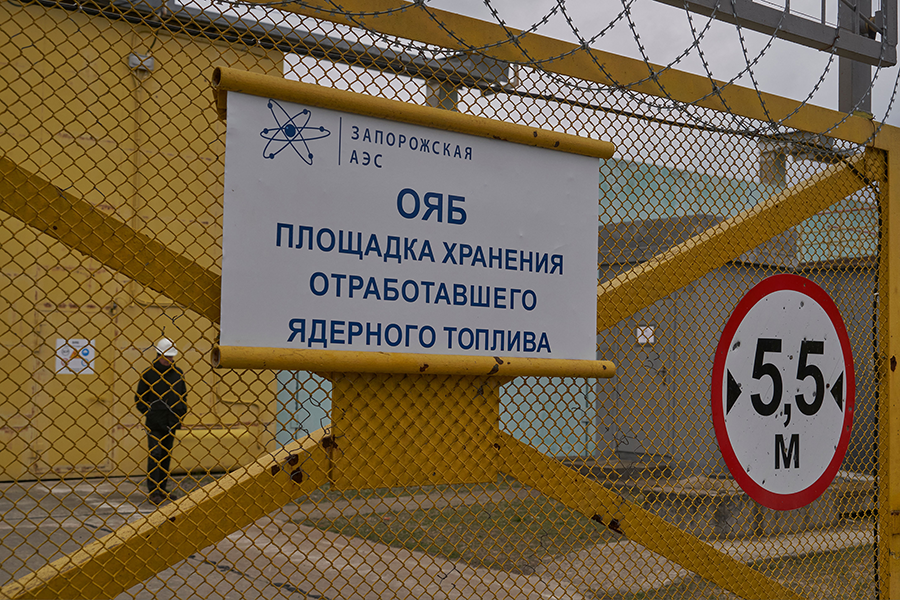“For 50 years, the Arms Control Association has educated citizens around the world to help create broad support for U.S.-led arms control and nonproliferation achievements.”
Russia Orders Evacuations Around Zaporizhzhia
June 2023
By Kelsey Davenport
Russia evacuated areas surrounding the Zaporizhzhia Nuclear Power Plant in May in anticipation of intensified fighting in the vicinity. The evacuations prompted new warnings from Ukrainian officials and the head of the International Atomic Energy Agency (IAEA) about how deteriorating working conditions at the facility pose a nuclear security and safety risk.
 The Russian-backed governor of Zaporizhzhia province, which includes the power plant, ordered the evacuations in response to intensified Ukrainian shelling in the area that appears to be part of a larger counteroffensive designed to retake the province. Although Russia is illegally occupying the nuclear facility and pressured some workers at Zaporizhzhia to sign contracts with the Russian state energy company Rosatom, the power plant is still run by the Ukrainian energy company Energoatom.
The Russian-backed governor of Zaporizhzhia province, which includes the power plant, ordered the evacuations in response to intensified Ukrainian shelling in the area that appears to be part of a larger counteroffensive designed to retake the province. Although Russia is illegally occupying the nuclear facility and pressured some workers at Zaporizhzhia to sign contracts with the Russian state energy company Rosatom, the power plant is still run by the Ukrainian energy company Energoatom.
Petro Kotin, head of Energoatom, said on May 9 that the evacuations risk creating a “catastrophic lack” of personnel and raised concerns about continued operations at the plant. The six reactors are shut down, but the facility still requires electricity and water to cool the units. Kotin warned that certain operations require constant oversight and that “it will be dangerous for the plant” if there are not enough personnel to manage those operations.
Rosatom officials at Zaporizhzhia said that the evacuations will not include essential staff for operating the plant. But many workers live in the nearby town of Enerhodar, which was included in the evacuation orders, so their families may be affected.
In a May 12 press release, IAEA Director-General Rafael Mariano Grossi raised concerns about the welfare of staff and their families and the impact that the evacuations may have on safety and security at the plant. The IAEA team on-site at Zaporizhzhia confirmed that it still has enough staff for essential operations, Grossi said, but he warned that the current situation is “not sustainable.”
Grossi said that nuclear safety “requires adequate maintenance of plant equipment” and expressed concern that these maintenance programs have not been followed “for many months.” As a result, the risk of a nuclear accident is increasing in the “medium and longer term,” he said.
For example, the IAEA noted that the only remaining emergency backup power line to the plant was severed in March and has not been restored. External power is necessary for ensuring the cooling of the facility.
“This is not a way to operate a major nuclear power plant safely, securely, and sustainably,” Grossi warned.
Grossi also said that he is still engaged in “intense negotiations” with Russia and Ukraine to reach an agreement on protecting the Zaporizhzhia plant. Grossi initially was focused on establishing a protection zone around it, but in April announced that he shifted focus to negotiating an agreement to protect certain areas of the complex. (See ACT, May 2023.)
In a May 13 interview with CBC News, Grossi said that he is trying to establish some basic rules for fighting around the plant without giving either side a military advantage. He said there is a “very narrow path” to reaching a mutually acceptable agreement.
The rules Grossi is pursuing could include an agreement not to use heavy weapons at the plant, not to fire directly at the facility, and not to target Zaporizhzhia personnel. It is unclear how such an agreement would be enforced. Ukrainian and Russian forces deny shelling in the vicinity of the plant, and Russian officials have argued in the past that its armed personnel at the facility are not military forces.
Russian officials have expressed support for Grossi’s plan, but it is unclear if Ukraine will agree to measures that could make it more difficult to retake the Zaporizhzhia complex and the surrounding area.
Kotin accused Russian forces of turning the plant into a military base and stationing soldiers at the facility because Moscow believes Ukrainian forces will be reluctant to target the nuclear complex.
